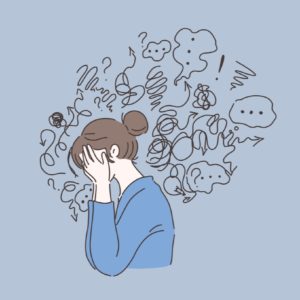
During the COVID-19 pandemic, the Centre for Specialist Psychological Therapies at Cumbria, Northumberland, Tyne and Wear NHS Foundation Trust (CNTW) has been running wellbeing livecasts.
Each week, staff are invited to join a livecast which covers a specific topic. Clinical psychologist and co-author of a highly rated book on overcoming worry Kevin Meares delivered a livecast on worry and uncertainty.
“Worry is a physical sensation, not just a thought. It can be a gnawing, sickening, tense feeling. Worry can come out of the blue; one minute you can be enjoying yourself and then suddenly you start thinking ‘what if?’ Worry takes us away from the here and now.
“Broadly, there are two types of worry, ones in which we think about real events and others that are hypothetical. For real events, worrying about problems although understandable, will not solve them. If there is a problem that we can do something about then, then the best thing to do is approach the problem and see if you can solve it.
“Hypothetical worries are things that might happen in the future but are not happening now. When it comes to a hypothetical worry, it’s impossible to solve an issue that hasn’t happened or may never happen in the way that it is imagined. A good tip is to write down your hypothetical worry and learn to face it to get some perspective on it; worries are thoughts not facts. Worry like this takes us into the future, it might help to recognise this and say out loud to yourself ‘there’s nothing I can do about this right now’.
“None of us like uncertainty. Not knowing what’s going to happen can be extremely difficult. There has been a shift in the world and we are all going through a time of significant uncertainty. That uncertainty fuels worry, and our creative minds can imagine multiple possible negative outcomes in our worry.
“An increased level of worry is understandable at this time; for instance, we might have noticed worrying more about our families, our health, or our children’s education or money. People can deal with worry in different ways. They might seek lots of information, for example constantly watching news channels or checking in social media, or they might bury their head in the sand and ignore all advice and information. Some will prepare for the worst, for instance stockpiling or bulk buying, and others will make no preparations at all. The key here is a balance between knowing enough to make good decisions and choices but not over engaging in seeking information as often we get different messages from different sources of information, this can make us feel more uncertain and trigger more worry. Not attending to problems by burying our heads in the sand´ might mean that we leave lose ends, again ramping up uncertainty and worry.
“It’s important to keep perspective during this time. The pandemic will have a beginning, a middle and an end. We have managed a lot and dealt with a lot of uncertainty already. Worry is normal at a time like this. It’s not about not worrying at all, but about managing that worry.”
• Muscular tension – take a hot bath, try some yoga or gentle stretching
• Restlessness – listen to music, exercise
• Fatigue – take regular breaks, eat a balanced diet and look after your body
• Feeling irritable – give yourself and others a bit more slack. Try and count to 10 before responding to others
• Struggling to sleep – keep a notepad by your bed and write down what might be worrying you, more information and resources on sleep can be found here
• Struggling to concentrate – try and bring awareness back to your body, do this by noticing the things around you and the sensations think about what you see, smell etc.
You can listen to all our wellbeing livecasts on the CNTW YouTube channel.
